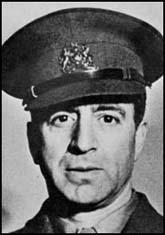Victor Gerson

Victor Gerson, the son of a textile merchant, was born in Southport, Lancashire, in 1898. On the outbreak of the First World War he joined the British Army and was sent to the Western Front in France. In 1916 he was promoted to the rank of corporal and took part in the battle of the Somme.
After the war Gerson moved to France and became a dealer in fine rugs and carpets in Paris. He married a local woman and the couple had a son. In the 1930s his wife died and his son was killed in a road accident. Gerson remarried and continued to live in France until the German Army invaded in May 1940. When Henri-Philippe Petain signed the armistice with Nazi Germany in June, Gerson and his wife, Giliana Gerson fled to England.
Soon after arriving in England both Gerson and his wife joined the Special Operations Executive (SOE). In May 1941 Giliana became the first woman in the SOE to be sent to occupied France. She travelled to Vichy and as well as spying on Petain's government she collected documents such as ration cards that could be reproduced by the SOE for its undercover agents in France.
On 6th September 1941, Gerson, along with Michael Trotobas, were dropped by parachute into occupied France. After being met by SOE's advance party in Chateauroux he visited Lyons and Marseilles where he assessed the possibility of organizing subversive networks in the towns.
He returned to London to report on his views about the willingness of the French population to resist the German occupation. Encouraged by what he told them, Gerson was sent back with Peter Churchill on 21st April, 1942. He settled in Lyons where he gradually built up a local network of resistors. With the help of George Levin and Jacques Mitterand, he also established groups in Paris and Perpignan.
Gerson imposed strict rules on his members and despite the circuit being penetrated three times by the Gestapo (June, 1943, October 1943 and January 1944) and although some were arrested the group were able to continue its activities. Gerson was arrested once while travelling on a train between Paris and Lyons. However, Gerson's cover story was so convincing he was soon released.
After the liberation of France Gerson returned to Paris where he continued a dealer in fine rugs and carpets.
Primary Sources
(1) Rules issued to members of the circuit run by Victor Gerson during the Second World War.
Members were only known and referred to by their pseudonyms.
Domiciles of the regular staff of the Circuit always remained secret.
New members of the Organization had to drop all previous clandestine activities.
All regular members had to sever contact with their families, and (move house from) where they had lived before being in the Circuit.
It was strictly forbidden to carry any papers or notes giving names of contacts, or addresses.
Verbal messages between Informant and Organizer through couriers were always given in veiled language which couriers could not understand.
When messages could not be put in veiled language or could not be remembered by the courier, it would be written on thin tissue paper, inserted into a cigarette, or carried in such a way that it could easily be eaten or dropped.
Passwords had to be given, word perfect, otherwise they would not be accepted.
Bodies in safe houses were not allowed to go out at any time under any circumstance (except of course when it was time to move on).
Members were never to call on any safe house without first checking the security of the house by telephone.
(2) M. R. D. Foot, Six Faces of Courage (1978)
What held the circuit together, as a working organism, beyond its members' love of France and hatred of nazi occupation, was the quiet strength of its commander's personality. Not many people who worked for him knew him even by sight; he knew a good many more of them, by sight and by pseudonym at least. His own pseudonym of 'Vic' became known all down the line; so did some of his rules about how to behave, and nobody, in that rather more orderly society than our own, wanted to do anything of which 'Vic' was known to disapprove.
